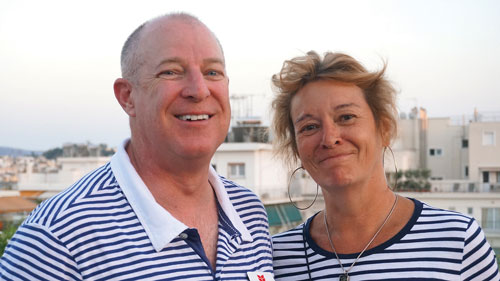
Filling the Gap in Student Mental Health Care
“I had a wonderful experience at Grinnell in academics, socially, and playing varsity sports, and made life-long friends, but I also had occasional bouts of depression,” says Sheryl Walter ’78, a Board of Trustees member. “It has occurred to me in retrospect that I and likely other classmates could have benefited even more from our Grinnell experiences if there had been ready access to a broad range of mental health and wellness services.”
This realization inspired Walter to establish the Strategic Resource Fund for Health and Counseling Programs at Grinnell in 2017 to students on campus.
Encouraged by the success of the fund, Walter recently announced a planned gift of $1.7 million to help provide students even greater access to mental health and wellness services.
 Edward Senn ’79 and Sheryl Walter ’78 in Greece during the 2014 Grinnell Alumni Study Tour. Photo by Amy Henderson ’94
Edward Senn ’79 and Sheryl Walter ’78 in Greece during the 2014 Grinnell Alumni Study Tour. Photo by Amy Henderson ’94“I established the fund so that I and others can contribute to make resources available to students who might need them now,” she says. “The goal is to normalize perceptions about mental health and make it even more possible for students to reach out and ask for help if they need it, which in turn will help enhance social and academic experiences for them and the Grinnell community as a whole.”
The fund builds upon efforts of the Student Mental Health Task Force established by President Raynard S. Kington in 2016 to help the College address the mental health needs of students through expanded mental health clinical services, tele-psychiatry, and wellness programming. As a result, Student Health and Counseling Services was renamed Student Health and Wellness (SHAW) to better reflect the mission of the office and its staff, and the position of dean for health and wellness was created to lead those efforts.
Although the efforts that resulted from the work of the Student Mental Health Task Force have had a meaningful impact on campus, Walter recognized that students could benefit from additional resources. Based on her own experiences while a student, she understands what a difference such support can mean. “It is personal for me,” she says.
Walter’s gift will provide significant support that will allow the College to address the task force recommendations, which include continued enhancement of counseling and treatment services geared to the needs of the Grinnell student body, outreach and educational programs, addressing environmental and cultural factors when promoting mental health, and continued assessment of student mental health and wellness needs and evaluation of services meant to address them.
“What I hope to do with my gift is encourage others to give to the Strategic Resource Fund for Health and Counseling Programs in support of SHAW services and build on its successes to ensure there is a comprehensive mental health and wellness system in place to serve students now and in the future,” Walter says. “I also hope to help make it even more acceptable for students to get the help they may need. Making this possible will help every student thrive at Grinnell.”
Walter’s gift contributes to the Campaign for Grinnell College.
